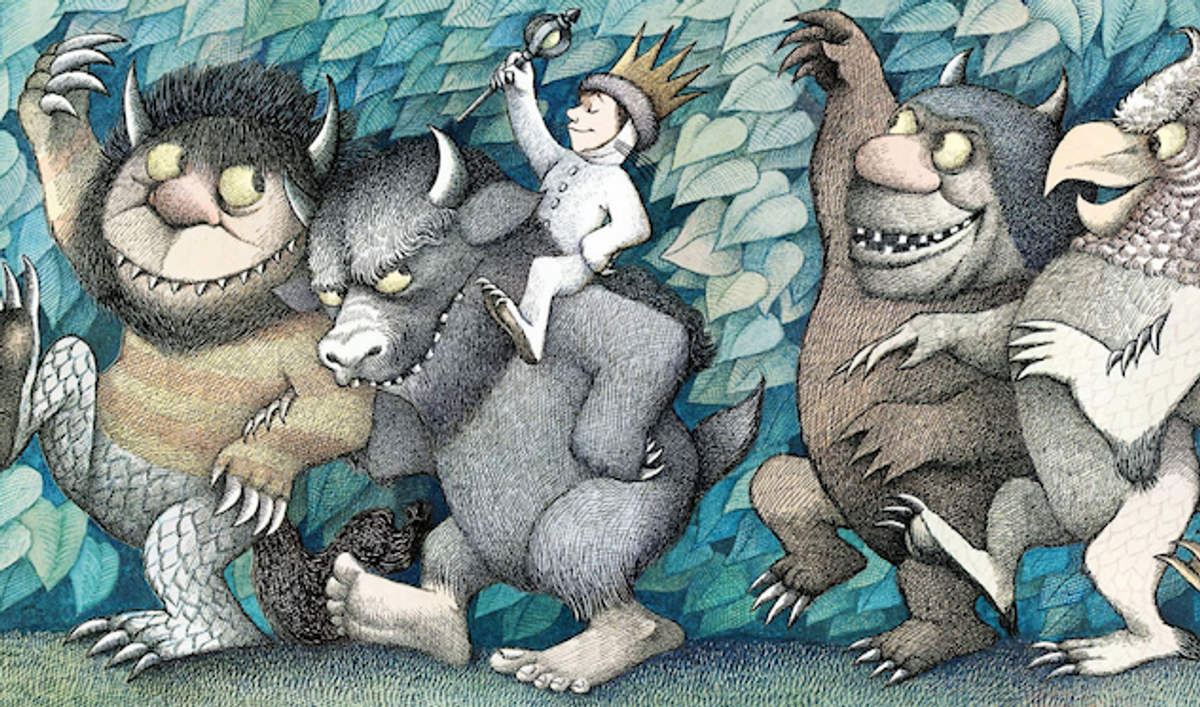Entertainment
Call of the Wild

Gregory Maguire on Sendak's legacy and the commitment to the complexity of children
October 21 2009 8:00 PM EST
February 05 2015 9:27 PM EST
By continuing to use our site, you agree to our Private Policy and Terms of Use.

Much has been made of Where the Wild Things Are, Maurice Sendak's 10-sentence mythic journey; of the scale and pacing of the exposition; of the fact that the wild things are both larger than Max but also, brilliantly, childlike in proportion, with smallish torsos and biggish heads. The ink has not so much been spilled as it has tsunami-ed across the pages of educational journals, psychoanalytic studies, PhD theses, and museum catalog copy. The 40-page picture book deserves its place on the shelf of 20th-century American literature, along with other masterworks like My 'ntonia, The Sound and the Fury, Angels in America, Beloved, Charlotte's Web, The Great Gatsby, and 'The Lottery.'
Given Sendak's stature as the most decorated children's book artist in history, it is sometimes easy to overlook the obvious: However many medals of honor he piles up, however many museum curators and opera and ballet companies come to curry favor, Sendak has never betrayed his earliest allegiance: the one with children.
His is not a sentimental affection. No one is less sentimental about children than Sendak. His sympathy is sometimes theoretical and only occasionally carries over into practice. (I once offered to drop by for a quick hello as I was motoring past his town, and I was advised to leave my own kids in the lobby of my hotel'nearly in so many words.)
Still, Sendak's commitment as an artist centers on his appreciation of the almost miraculous complexity of children as they begin to sort out their strengths and weaknesses, their needs and aversions, their broken-hearted revisions of the rules of the species and the world. Infants on their mothers' laps do this no less ferociously than the characters in Henry James or Herman Melville or Homer , to name a few of Sendak's heroes.
Where the Wild Things Are is now a film . It has been an opera and a filmstrip and a ballet. Maybe even a lunchbox or a video game by now. But we can't ignore that Where the Wild Things Are is essentially a book. Its magic only beings when the sensibility of a child is gripped by the accumulation of pebbly syllables and the anticipation of the gravely comic antics of Max and his wild things.
In all true picture books the author-artist prepares the game plan, but the audience directs the proceedings. The artist settles the book in the lap of the child, much as the composer puts the score on the stand of the conductor. But at a concert or a film or a ballet the action is inexorably paced by the baton of the conductor or director or choreographer. In a picture book, the child is the conductor, selecting adagio or andante or con brio for the most individualized and appropriately accounted timing of the work. Without the child as conductor, the story is a shadowy thing. It is the child reader who gives it life, who animates it to perfection.
I am among those who have crowed for 30 years that writers of books for children shouldn't be restricted to warm lemonade at the backyard picnic table while other artists are urged to swan in and sip the St.-'milion. Artists are artists. By extension, however, let us not forget what artists who work for children remember at least as well as anyone else: Children are human too. Not half-human, not half-beast, not adults-in-embryo, but fully human, fully complex, fully deserving, fully dangerous, fully ready.
So lift a glass of wine or lemonade, whatever it might be, to Sendak, the man who reminds us every time we get ready to forget that children are our cousins, way back. Cousins, citizens, companions, and coequals. Let's roar our terrible roar and roll our terrible eyes so the kids can hear us as well as the original wild thing himself.
Gregory Maguire is the author of Making Mischief: A Maurice Sendak Appreciation (William Morrow).
Sexy MAGA: Viral post saying Republicans 'have two daddies now' gets a rise from the right